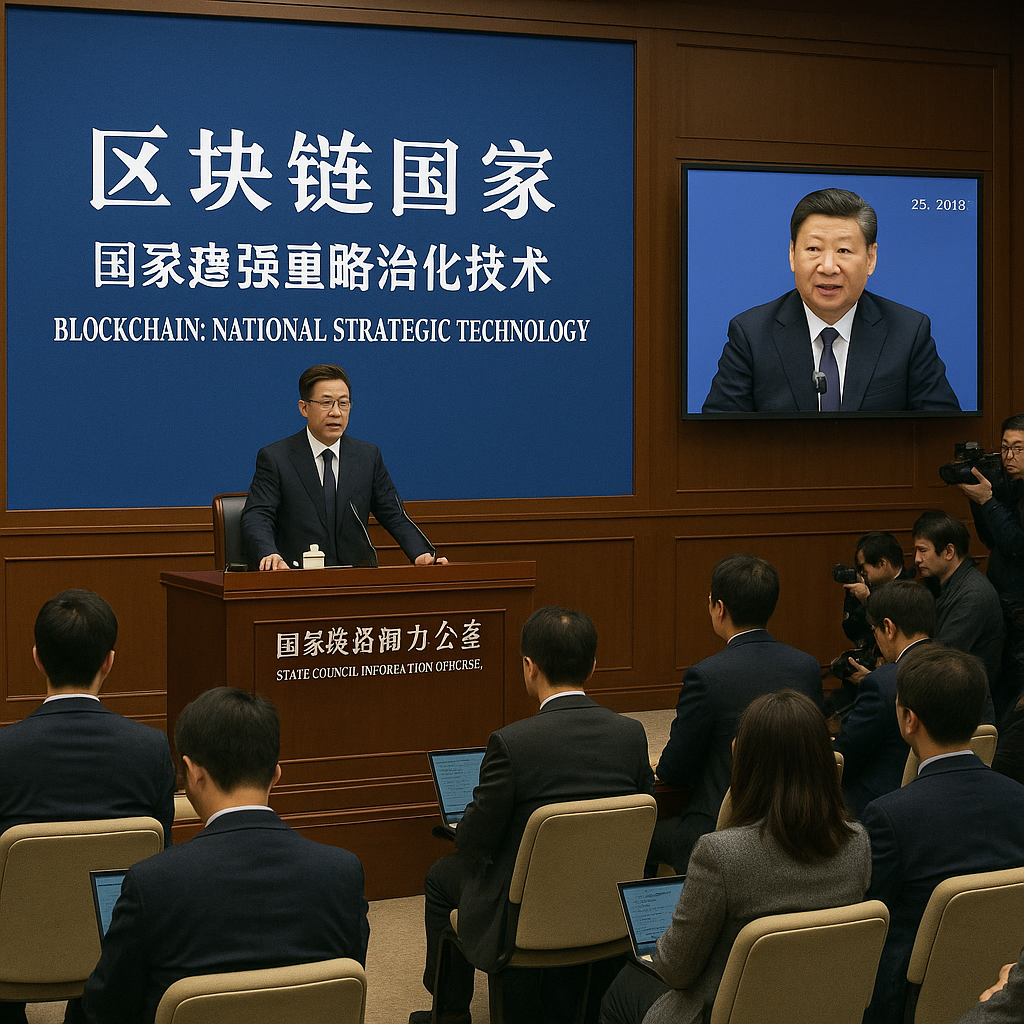China’s Xi Jinping Backs Blockchain in Historic Policy Shift
In a watershed moment for blockchain technology, Chinese President Xi Jinping publicly endorsed the development and adoption of blockchain in China during a Politburo meeting on October 24, 2019. The announcement sparked immediate reaction across global markets, with Bitcoin surging over 30% in the following 48 hours, and blockchain-related stocks in China hitting record highs.
The speech marks a dramatic policy shift in the world’s second-largest economy, positioning blockchain as a strategic priority for national development — not merely a financial experiment. For the global crypto community, Xi’s statement signaled both opportunity and caution, as China’s approach to blockchain remains heavily regulated and separate from decentralized cryptocurrency ideals.
What Exactly Did Xi Jinping Say?
During the meeting of the Communist Party’s Central Committee for Political and Legal Affairs, Xi called on China to “seize the opportunities presented by blockchain technology” and urged acceleration of development across sectors such as:
-
Digital finance
-
Supply chain management
-
Smart manufacturing
-
Government transparency
-
Healthcare and education
Xi stated that blockchain would play a “core role in the next wave of technological innovation and industrial transformation.” He emphasized the need for China to take a leading position globally in research, development, and application of blockchain systems.
This is the first time a Chinese head of state has offered direct and unambiguous support for blockchain on a national stage.
Market Reactions: Bitcoin Surges, Altcoins Follow
Xi’s endorsement sent immediate shockwaves through both traditional and crypto markets:
-
Bitcoin (BTC) rose from ~$7,400 to over $10,300 within two days — a 42% gain, the third-largest single-day percentage increase in its history.
-
Altcoins such as Ethereum, NEO, VeChain, and Ontology — all with China-linked development teams or investor bases — also surged.
-
In China’s domestic stock market, over 100 blockchain-related equities hit limit-up (the daily max price increase), including companies like Shenzhen Forms Syntron and Dalian My Gym Education.
Although the price gains cooled later, the policy message had already reignited interest in blockchain across Asia.
Why Blockchain, Why Now?
China’s interest in blockchain is not new — but the timing and context of Xi’s announcement suggest a deeper strategic shift.
1. Tech Sovereignty
With U.S.-China tensions still elevated due to the trade war and ongoing disputes over intellectual property and 5G leadership, blockchain offers China a path to domestic innovation that avoids dependency on Western platforms.
2. Digital Currency Ambitions
China’s central bank, the People’s Bank of China (PBoC), has been working for years on a Digital Currency Electronic Payment (DCEP) system. Xi’s speech may be laying the ideological foundation for state-backed digital infrastructure, distinct from cryptocurrencies like Bitcoin but powered by blockchain principles.
3. Economic Modernization
China’s vast bureaucracy and outdated record-keeping systems are prime candidates for blockchain-based transparency and automation. Applications in logistics, healthcare, land registries, and trade finance are already underway in several pilot zones.
What This Means for Crypto Markets
While Xi’s comments were squarely aimed at blockchain technology — not at Bitcoin or decentralized finance — the crypto markets interpreted his speech as a net positive for several reasons:
1. Legitimization
A public endorsement from the leader of China gives blockchain an unprecedented level of political legitimacy. It signals to other governments, investors, and tech leaders that blockchain is no longer fringe.
2. Investment and Talent Flows
Blockchain startups and academic programs in China are likely to receive state funding, regulatory support, and enterprise collaboration, increasing the pace of innovation.
3. Speculative Hype
Although speculative surges followed the announcement, market analysts cautioned that not all gains were sustainable. The rally revealed how reactive crypto markets remain to macro policy narratives, especially from China.
What’s the Catch?
Despite the bullish headlines, Xi’s endorsement comes with caveats that crypto investors should not ignore.
1. Support for Blockchain ≠ Support for Crypto
China continues to ban cryptocurrency trading platforms, initial coin offerings (ICOs), and foreign exchanges. The government draws a clear distinction between blockchain as a technology and decentralized assets like Bitcoin or Ethereum.
2. Focus on State-Controlled Platforms
China’s vision for blockchain is centralized and controlled — using permissioned networks where nodes are verified by state-approved institutions. This stands in contrast to the open-source, decentralized ethos of public blockchains.
3. Propaganda Risk
Analysts warned that the Politburo meeting could be used to amplify surveillance and social scoring systems, with blockchain providing immutable audit trails of citizen activity. In this model, blockchain becomes a tool for technocratic governance, not individual empowerment.
China’s Blockchain Projects Already in Motion
Xi’s speech wasn’t merely aspirational — it built upon initiatives already underway.
-
The PBoC fast-tracked internal testing of its digital currency across banks like ICBC, Bank of China, and Alibaba’s Ant Financial.
-
Hangzhou, Shenzhen, and Guangzhou launched blockchain-based city governance pilots.
-
State media and universities began offering blockchain certification programs to develop technical talent.
In 2019 alone, China filed over 7,600 blockchain-related patents, surpassing the U.S. and South Korea combined.
International Implications
Xi’s announcement adds urgency to blockchain developments in Europe, India, and North America.
-
Facebook’s Libra had already sparked discussions among central banks about digital currencies.
-
The European Central Bank (ECB) and Bank of England began exploring sovereign digital currency frameworks.
-
In the U.S., regulators and lawmakers expressed concern that China’s blockchain leadership could translate into financial and geopolitical influence.
As of October 2019, the global blockchain race had moved from experimental to strategic.
Conclusion
President Xi Jinping’s October 2019 endorsement of blockchain represents a turning point in global technology policy. While it does not mark an embrace of decentralized cryptocurrencies, it confirms that blockchain has entered the realm of national strategy and long-term economic planning.
For crypto markets, the short-term reaction was bullish — but the long-term impact may be even more significant. As China accelerates its blockchain roadmap, other nations and industries will be forced to respond.
The race for blockchain leadership is no longer theoretical. It’s official. And it’s global.
